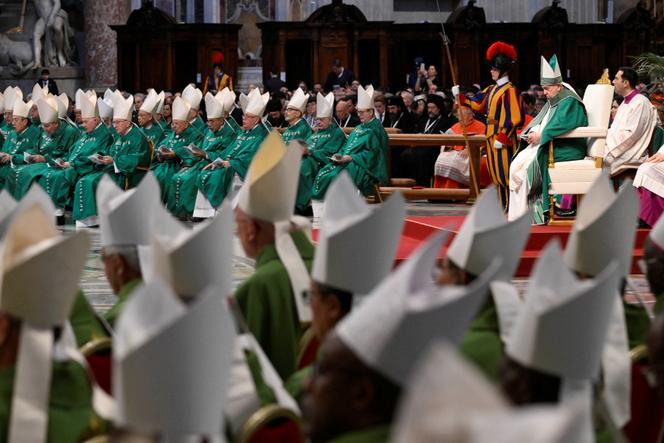


Liturgy does not tolerate equality. On Sunday morning, October 29, at the closing Mass of the first assembly of the Synod on Synodality, the great meeting called by Pope Francis to reflect on the future of the Catholic Church, everyone once again took their rightful place in Rome's Saint Peter's Basilica: cardinals dressed in green chasubles in first place, then bishops, also in green, and finally the laity. But for four weeks, from October 4 to 29, they sat side by side at round tables set up for the occasion in Paul VI Hall, to discuss possible changes in the governance of the Catholic Church.
In this way, the assembly visually embodied the change in culture sought by a pope eager to see the faithful participate more actively in the government of the institution. For the first time in history, the assembly even included women. 54 out of 365 were able to vote. On the menu for these four weeks of discussions, which many found a little long, based on questions raised by the faithful from around the world who were interviewed for the occasion: the place of women in the Catholic Church, the inclusion of LGBTQ people, the excessive role of clerics, and the fight against sexual abuse and violence.
On Saturday evening, the assembly, which was only the first - the next, which should be conclusive, will take place in October 2024 - delivered the summary report of its work in Italian. The text, admittedly provisional, contains no definitive recommendations, but instead puts forward suggestions and leaves open questions presented as "issues to be addressed." Unsurprisingly, the place of women in the Catholic Church, which all the faithful spoke about to a greater or lesser extent in their pre-synod feedback, figured prominently.
The discussions focused in particular on the possibility of ordaining women deacons, those ministers of religion whose role is to assist priests in their liturgical duties. Although the chapter devoted to this question was adopted on Saturday, like the rest of the text presented, it was also the one that received the most negative votes, a sign of the still strong differences of opinion among the prelates on the desirability of giving more room to women, who represent half of the 1.3 billion Catholics. For "some," it said, "such a step would be unacceptable because it would break with tradition."
Another obvious point of division is the issue of homosexuality. While the acronym LGBTQ originally appeared in the working document, it had completely disappeared from the final synthesis in favor of "gender identity" and "sexual orientation." The chapter that timidly evokes a more inclusive church on this subject also met with more opposition than the others. On Saturday, American Jesuit James Martin, a leading defender of the LGBTQ community in the church and a member of the synod's general assembly, made no secret of his disappointment. "There were widely diverging views on the topic. I wish, however, that some of those discussions, which were frank and open, had been captured in the final synthesis," he told the American website National Catholic Reporter.
You have 50% of this article left to read. The rest is for subscribers only.
